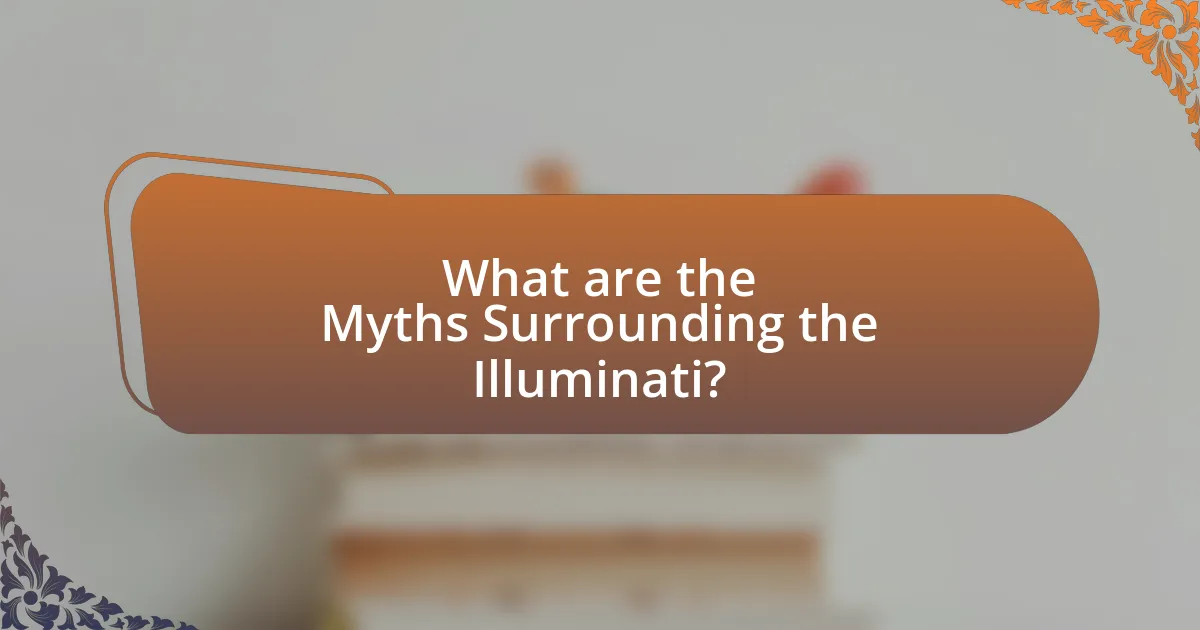The article “Uncovering the Myths Surrounding the Illuminati” examines the misconceptions and historical context of the Illuminati, a secret society founded in 1776 in Bavaria by Adam Weishaupt. It explores the origins of the Illuminati myth, its association with conspiracy theories, and the psychological factors that drive belief in such theories. The article also highlights the impact of social media on the spread of these myths, the role of popular culture in shaping perceptions, and the importance of debunking misinformation to foster critical thinking and public trust. Key figures involved in the early Illuminati and the societal implications of believing in these myths are also discussed, providing a comprehensive overview of the topic.

What are the Myths Surrounding the Illuminati?
The myths surrounding the Illuminati primarily include the belief that it is a powerful secret society controlling world events, the idea that it is involved in global conspiracies, and the notion that it has infiltrated governments and influential organizations. These myths stem from historical references to the Bavarian Illuminati, founded in 1776, which aimed to promote Enlightenment ideals but was disbanded in the late 18th century. Despite its dissolution, the term “Illuminati” has been appropriated in popular culture to suggest a shadowy organization manipulating society, often without credible evidence. The lack of verifiable proof for these claims reinforces their status as myths rather than facts.
How did the concept of the Illuminati originate?
The concept of the Illuminati originated in 1776 with the formation of the Bavarian Illuminati, a secret society founded by Adam Weishaupt in Ingolstadt, Germany. Weishaupt aimed to promote Enlightenment ideals and combat religious and political oppression through rational thought and secularism. The society sought to influence political decisions and promote social reform, attracting intellectuals and influential figures of the time. The Bavarian government eventually banned the group in 1785, but the term “Illuminati” has since evolved to encompass various conspiracy theories, often detached from its original context.
What historical events contributed to the formation of the Illuminati myth?
The formation of the Illuminati myth is primarily attributed to the establishment of the Bavarian Illuminati in 1776, which aimed to promote Enlightenment ideals and counteract religious and political oppression. This secret society, founded by Adam Weishaupt, was perceived as a threat by contemporary authorities, leading to its suppression in the late 1780s. Additionally, the French Revolution (1789) fueled conspiracy theories linking the Illuminati to revolutionary activities, as many believed that the society orchestrated the upheaval to undermine monarchies. The publication of works like “Proofs of a Conspiracy” by John Robison in 1798 further propagated the myth, alleging that the Illuminati infiltrated various institutions to manipulate global events. These historical events collectively contributed to the enduring myth of the Illuminati as a clandestine group exerting control over world affairs.
Who were the key figures involved in the early Illuminati?
The key figures involved in the early Illuminati included Adam Weishaupt, the founder, and prominent members such as Johann Wolfgang von Goethe, Baron von Knigge, and Joseph von Sonnenfels. Adam Weishaupt established the Bavarian Illuminati in 1776 with the aim of promoting Enlightenment ideals and rational thought. Johann Wolfgang von Goethe, a renowned writer and statesman, was associated with the group, contributing to its intellectual discourse. Baron von Knigge played a significant role in expanding the organization and formalizing its structure. Joseph von Sonnenfels, an influential educator and philosopher, also supported the Illuminati’s objectives. These individuals were instrumental in shaping the early direction and influence of the Illuminati during its formative years.
Why do people believe in Illuminati conspiracies?
People believe in Illuminati conspiracies due to a combination of distrust in authority, the allure of secret knowledge, and the tendency to find patterns in complex events. This belief is often fueled by historical references to the Illuminati, a group founded in 1776 that aimed to promote Enlightenment ideals but was disbanded shortly thereafter. The idea that powerful elites manipulate global events resonates with individuals who feel powerless or marginalized, leading them to seek explanations for societal issues. Additionally, psychological factors such as cognitive biases, including confirmation bias, reinforce these beliefs by causing individuals to focus on information that supports their views while dismissing contradictory evidence.
What psychological factors drive belief in conspiracy theories?
Belief in conspiracy theories is primarily driven by psychological factors such as cognitive biases, social identity, and a need for control. Cognitive biases, including the proportionality bias, lead individuals to perceive significant events as being caused by intentional actions rather than random occurrences. Social identity influences belief, as individuals often align with groups that share similar views, reinforcing their beliefs through groupthink. Additionally, a need for control and understanding in a complex world drives people to seek out conspiracy theories as they provide simple explanations for complicated issues. Research by Goertzel (1994) found that individuals with lower levels of trust in government and higher levels of anxiety are more likely to endorse conspiracy theories, supporting the idea that psychological factors significantly contribute to these beliefs.
How does social media influence the spread of Illuminati myths?
Social media significantly influences the spread of Illuminati myths by facilitating rapid information dissemination and creating echo chambers. Platforms like Twitter, Facebook, and Instagram allow users to share conspiracy theories widely, often without verification, leading to increased visibility and acceptance of these myths. Research indicates that social media algorithms prioritize sensational content, which often includes conspiracy theories, thereby amplifying their reach. For instance, a study published in the journal “Nature” found that false news spreads more rapidly on social media than true information, highlighting how easily myths can gain traction. This environment fosters community engagement around these myths, further entrenching beliefs in the Illuminati as a pervasive cultural phenomenon.
What are some common misconceptions about the Illuminati?
Common misconceptions about the Illuminati include the belief that it is a powerful, secret society controlling world events, and that it consists of celebrities and political leaders. In reality, the Illuminati was originally a Bavarian Enlightenment group founded in 1776, aimed at promoting reason and secularism, which was disbanded in the late 18th century. The idea that it continues to operate as a clandestine organization is largely based on conspiracy theories lacking credible evidence. Additionally, the portrayal of the Illuminati in popular culture often exaggerates its influence and scope, leading to widespread myths that do not align with historical facts.
How do these misconceptions differ from historical facts?
Misconceptions about the Illuminati often portray it as a powerful, secretive organization controlling world events, while historical facts reveal that the Illuminati was a short-lived Enlightenment-era group founded in 1776 in Bavaria, primarily focused on promoting rationalism and secularism. The historical Illuminati disbanded by the late 1780s due to government suppression, contrasting sharply with the ongoing conspiracy theories that suggest its continued influence in modern society. These theories lack credible evidence and often rely on anecdotal claims rather than documented historical events, such as the group’s actual objectives and its dissolution, which are well-documented in historical texts.
What role does popular culture play in shaping these myths?
Popular culture plays a significant role in shaping myths surrounding the Illuminati by disseminating narratives that blend fact and fiction, thereby influencing public perception. Through films, music, literature, and social media, popular culture often portrays the Illuminati as a secretive organization controlling global events, which reinforces conspiracy theories. For instance, movies like “The Da Vinci Code” and songs by artists such as Jay-Z and Lady Gaga reference the Illuminati, creating a mystique that captivates audiences and perpetuates the myth. This portrayal is further amplified by online platforms where discussions and theories about the Illuminati gain traction, leading to a collective belief in its existence and influence.

How do the Myths Impact Society?
Myths significantly impact society by shaping beliefs, influencing behaviors, and guiding cultural narratives. For instance, the myth of the Illuminati has led to widespread conspiracy theories that affect public perception of authority and governance. Research indicates that such myths can create distrust in institutions, as seen in surveys where a significant percentage of people express skepticism towards government actions, attributing them to secretive organizations. This distrust can lead to social division and hinder collective action, demonstrating the profound societal effects of myths.
What are the social implications of believing in Illuminati myths?
Believing in Illuminati myths can lead to social division and mistrust among communities. Individuals who subscribe to these conspiracy theories often develop a sense of alienation from mainstream society, perceiving themselves as enlightened or aware, while viewing others as misled or ignorant. This belief can foster an “us versus them” mentality, which may result in increased polarization and conflict within social groups. Research indicates that conspiracy beliefs can undermine trust in institutions and authority figures, leading to a decline in civic engagement and social cohesion. For example, a study published in the journal “Political Psychology” found that belief in conspiracy theories correlates with lower trust in government and media, which can further exacerbate societal fragmentation.
How do these beliefs affect interpersonal relationships?
Beliefs about the Illuminati can significantly affect interpersonal relationships by fostering mistrust and suspicion among individuals. When people subscribe to conspiracy theories regarding the Illuminati, they may become skeptical of others’ intentions, leading to strained interactions and a breakdown in communication. Research indicates that belief in conspiracy theories can correlate with social isolation and reduced trust in social institutions, as individuals may perceive others as potential members of a secretive group with ulterior motives. This dynamic can create an environment where relationships are characterized by paranoia rather than openness, ultimately hindering the development of healthy connections.
What impact do they have on political discourse?
The Illuminati significantly influences political discourse by perpetuating conspiracy theories that shape public perception and debate. These theories often invoke fear and suspicion toward governmental institutions, leading to polarization among the populace. For instance, the belief in a secretive elite controlling global events can undermine trust in democratic processes, as seen in various surveys indicating that a substantial portion of the population believes in such conspiracies. This skepticism can result in decreased voter participation and increased support for populist movements, which capitalize on anti-establishment sentiments.
Why is it important to debunk these myths?
Debunking myths surrounding the Illuminati is crucial to prevent the spread of misinformation and conspiracy theories that can lead to societal harm. Misinformation can foster fear, distrust, and division among communities, as seen in various historical contexts where unfounded beliefs have incited violence or discrimination. For instance, the propagation of conspiracy theories has been linked to real-world events, such as the rise of hate crimes against specific groups based on false narratives. By addressing and correcting these myths, individuals can promote critical thinking and informed discourse, ultimately contributing to a more educated society.
What are the potential dangers of perpetuating conspiracy theories?
Perpetuating conspiracy theories poses significant dangers, including the erosion of trust in legitimate institutions and the promotion of harmful behaviors. When individuals believe in unfounded conspiracy theories, they may reject credible information from governments, scientists, and media, leading to widespread misinformation. For instance, a study published in the journal “Psychological Science” found that belief in conspiracy theories can correlate with lower trust in public health measures, which was evident during the COVID-19 pandemic when misinformation about the virus spread rapidly. Additionally, conspiracy theories can incite violence, as seen in incidents where individuals acted on false beliefs about supposed threats, leading to real-world harm. These dangers highlight the critical need for promoting critical thinking and media literacy to combat the spread of conspiracy theories.
How can misinformation about the Illuminati affect public trust?
Misinformation about the Illuminati can significantly undermine public trust in institutions and authorities. When false narratives proliferate, they create a climate of skepticism, leading individuals to question the legitimacy of government actions, media reports, and societal norms. For instance, studies have shown that conspiracy theories, including those surrounding the Illuminati, can erode trust in public health initiatives, as seen during the COVID-19 pandemic when misinformation led to vaccine hesitancy. This erosion of trust can result in decreased civic engagement and increased polarization within society, as individuals gravitate towards echo chambers that reinforce their beliefs.

What are the Realities Behind the Illuminati?
The Illuminati refers to a historical group founded in 1776 in Bavaria, known as the Bavarian Illuminati, which aimed to promote Enlightenment ideals and combat religious and political oppression. This organization was disbanded in the late 1780s, but it has since become the subject of numerous conspiracy theories suggesting that it continues to exist and manipulate global events. These theories lack credible evidence and often rely on anecdotal claims rather than verifiable facts. The reality is that the original Illuminati was a short-lived society with no proven ongoing influence in contemporary society.
What is the actual history of the Illuminati?
The Illuminati originated in 1776 as the Bavarian Illuminati, founded by Adam Weishaupt, a professor of canon law at the University of Ingolstadt. This secret society aimed to promote Enlightenment ideals, such as reason and secularism, and sought to influence political decisions and societal norms through covert means. The group was disbanded in 1785 by the Bavarian government due to fears of its influence and potential subversion. Despite its short-lived existence, the term “Illuminati” has since been associated with various conspiracy theories, often inaccurately linking it to global control and manipulation. Historical records indicate that the original Illuminati had limited membership and focused primarily on intellectual discourse rather than the nefarious activities attributed to it in modern myths.
What were the original goals of the Bavarian Illuminati?
The original goals of the Bavarian Illuminati were to promote Enlightenment ideals, including reason, secularism, and the separation of church and state. Founded in 1776 by Adam Weishaupt, the organization aimed to combat religious and political oppression through education and the spread of rational thought. The Illuminati sought to influence political decisions and societal norms by infiltrating existing power structures, such as the government and religious institutions, to foster a more enlightened society. Historical records indicate that the group was particularly focused on advancing liberty and equality, reflecting the broader Enlightenment movement of the 18th century.
How did the organization evolve over time?
The Illuminati evolved from a Bavarian secret society founded in 1776, initially aimed at promoting Enlightenment ideals and combating religious and political oppression. Over time, the organization transformed into a subject of conspiracy theories, often depicted as a powerful, shadowy group manipulating global events. This shift occurred as the original group’s activities diminished by the late 1780s, leading to its mythologization in popular culture, where it became associated with various political and social movements, despite a lack of concrete evidence supporting these claims.
How do modern interpretations of the Illuminati differ from historical facts?
Modern interpretations of the Illuminati often depict it as a powerful, secretive organization controlling world events, which significantly diverges from historical facts. Historically, the Illuminati was a Bavarian secret society founded in 1776, primarily focused on promoting Enlightenment ideals and opposing religious and political oppression. The original group disbanded by the late 1780s, and there is no credible evidence to support the existence of a contemporary, all-encompassing Illuminati that manipulates global affairs. This contrast highlights how modern narratives have exaggerated and mythologized the group’s influence, often conflating it with various conspiracy theories lacking factual basis.
What are the key differences between the historical Illuminati and contemporary conspiracy theories?
The key differences between the historical Illuminati and contemporary conspiracy theories lie in their origins, objectives, and societal perceptions. The historical Illuminati, founded in 1776 in Bavaria, aimed to promote Enlightenment ideals and combat religious and political oppression through rational discourse. In contrast, contemporary conspiracy theories often depict the Illuminati as a secretive organization manipulating global events for control, lacking credible evidence and relying on sensationalism. Historical records, such as the dissolution of the Bavarian Illuminati in 1785, highlight its limited influence, while modern theories proliferate through social media, reflecting societal fears and distrust in institutions rather than factual foundations.
How do scholars view the relevance of the Illuminati today?
Scholars generally view the relevance of the Illuminati today as largely symbolic and reflective of contemporary societal anxieties rather than a significant, active organization. Research indicates that the term “Illuminati” has evolved into a catch-all for various conspiracy theories, often linked to distrust in government and elite institutions. For instance, a study by Karen M. M. H. van der Linden and others in “The Psychology of Conspiracy Theories” highlights how the concept of the Illuminati serves as a framework for individuals to explain complex social phenomena and perceived threats. This suggests that while the historical Illuminati may no longer hold relevance, its legacy persists in modern discourse as a representation of broader fears about power and control.
What can individuals do to critically assess Illuminati claims?
Individuals can critically assess Illuminati claims by researching credible sources and evaluating the evidence presented. Engaging with academic literature, such as peer-reviewed articles on conspiracy theories, allows individuals to understand the historical context and psychological factors that contribute to such beliefs. For instance, studies like “The Nature of Conspiracy Theories” by Karen M. M. M. van Prooijen and Paul A. M. van Dijk highlight cognitive biases that lead to the acceptance of conspiracy theories. Additionally, individuals should cross-reference claims with established facts and consult expert analyses to differentiate between substantiated information and sensationalized narratives. This approach fosters a more informed perspective on the validity of Illuminati claims.
How can critical thinking skills help in evaluating conspiracy theories?
Critical thinking skills enhance the evaluation of conspiracy theories by enabling individuals to analyze evidence, identify logical fallacies, and assess the credibility of sources. These skills allow a person to systematically question the validity of claims, differentiate between correlation and causation, and recognize biases in information. For instance, a study published in the journal “Applied Cognitive Psychology” by researchers at the University of Kent found that individuals with strong critical thinking abilities are better at discerning misinformation from factual data. This ability to critically assess information is crucial when confronting conspiracy theories, which often rely on emotional appeal rather than empirical evidence.
What resources are available for those seeking factual information about the Illuminati?
Factual information about the Illuminati can be found in academic books, peer-reviewed articles, and reputable websites. Notable resources include “The Illuminati: Facts & Fiction” by Mark Dice, which examines the historical context and myths surrounding the group, and the scholarly article “The Illuminati: A Historical Overview” published in the Journal of Modern History, which provides a critical analysis of the organization’s origins and influence. Additionally, websites like Snopes and the Encyclopedia Britannica offer fact-checked information that debunks common misconceptions about the Illuminati. These resources are credible and provide a well-rounded understanding of the topic.
